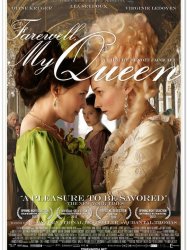Films with theme "Histoire de France", sorted by revenue

Vice and Virtue (1963)
, 1h45Directed by Roger Vadim
Origin France
Genres Drama, Comedy, Comedy-drama
Themes Medical-themed films, Prison films, Psychologie, Films about sexuality, Erotic films, Sexploitation films, Films about psychiatry, Political films, Women in prison films, Histoire de France, L'Occupation allemande en France
Actors Annie Girardot, Catherine Deneuve, Robert Hossein, O. E. Hasse, Philippe Lemaire, Serge Marquand
1944 : Justine est arrêtée tandis que sa sœur Juliette devient la maîtresse du colonel S.S Erik Schorndorf. Justine est déportée à la "Commanderie", en compagnie d'autres jolies filles, pour être les instruments de plaisir des chefs S.S.

Suite Française (2015)
, 1h47Directed by Saul Dibb, Saul Dibb
Origin France
Genres Drama, War, Romance
Themes French war films, Histoire de France, L'Occupation allemande en France
Actors Michelle Williams, Matthias Schoenaerts, Kristin Scott Thomas, Sam Riley, Heino Ferch, Ruth Wilson
In Nazi-occupied France, Lucille Angellier and her domineering mother-in-law await news of her husband. A regiment of German soldiers arrives, and promptly moves into the homes of the villagers. Lucille tries to ignore Bruno, the German commander coopting her house, but he soon infatuates her.

Bon Voyage (2003)
, 1h54Directed by Jean-Paul Rappeneau
Origin France
Genres Drama, Comedy, Comedy-drama, Black comedy
Themes French war films, Political films, Histoire de France, L'Occupation allemande en France
Actors Isabelle Adjani, Aurélie Matéo, Gérard Depardieu, Peter Coyote, Grégori Derangère, Virginie Ledoyen
It is 1940. When the movie begins, film star Viviane Denvert sits in the audience of a premiere of her new movie and notices a man who keeps staring at her. She is disturbed, and when the film is over and the audience has finished praising her, she rushes home, discovering that she is pursued by that same man. He chases her into her apartment.

The Umbrellas of Cherbourg (1964)
, 1h31Directed by Jacques Demy
Origin France
Genres Drama, Musical theatre, Musical, Romance
Themes French war films, La colonisation française, Pregnancy films, Films about music and musicians, Algerian War films, Musical films, Histoire de France
Actors Catherine Deneuve, Nino Castelnuovo, Anne Vernon, Marc Michel, Mireille Perrey, Ellen Farner
Madame Emery and her beautiful 17-year-old daughter Geneviève (Deneuve) sell umbrellas at their tiny (and financially struggling) boutique in the coastal town of Cherbourg in Normandy, France, in the late 1950s. Guy (Castelnuovo), is a handsome young auto mechanic who lives with, and cares for, his sickly aunt, godmother Elise. Guy and Geneviève are deeply in love; they want to get married, and they want to name their first child "Francoise". Madeleine (Ellen Farner) is the quiet, shy, dedicated young caregiver who looks after Guy's aunt; Madeleine also has feelings for Guy, but has not expressed this. Suddenly Guy is drafted and must leave to become a soldier in the Algerian War. The night before Guy leaves, he and Geneviève pledge their undying love. Then they make love (apparently for the first time) and the very next day, Guy leaves.

Return of the Hero (2018)
, 1h30Directed by Laurent Tirard
Origin France
Genres Drama, Comedy, Adventure, Historical
Themes Histoire de France, Napoleonic Wars films
Actors Jean Dujardin, Mélanie Laurent, Noémie Merlant, Fabienne Galula, Féodor Atkine, Christian Bujeau
En 1809, pendant la période du Premier Empire. Le capitaine Charles-Grégoire Neuville, fringant hussard, demande la main de Pauline Beaugrand, une jeune fille de bonne famille habitant un château dans une petite ville de Bourgogne, et reçoit un accord enthousiaste des parents. Mais alors que tout le monde se réjouit, il reçoit soudain l'ordre de partir immédiatement au combat, l'offensive contre les Autrichiens a commencé. Sur le point de partir, du haut de son cheval, il promet à Pauline de lui écrire une lettre tous les jours.

The Train (1964)
, 2h7Directed by John Frankenheimer, Arthur Penn, Bernard Farrel
Origin France
Genres Drama, War, Thriller, Action
Themes Transport films, Rail transport films, Political films, Histoire de France, L'Occupation allemande en France
Actors Burt Lancaster, Paul Scofield, Jeanne Moreau, Michel Simon, Wolfgang Preiss, Howard Vernon
In 1944, art masterpieces stolen by the Wehrmacht from French museums are being shipped to Germany; the officer in charge of the operation, Colonel Franz von Waldheim (Paul Scofield), is an ardent art lover and is determined to take the art to Germany, no matter the cost. After the Germans remove the art chosen by Waldheim from the Jeu de Paume Museum, curator Mademoiselle Villard (Suzanne Flon) seeks help from the French Resistance. Given the imminent liberation of Paris by the Allies, they need only delay the train for a few days—still, it is a dangerous operation and it must be done in such a way that does not risk damaging the priceless cargo.

The Princess of Montpensier (2010)
, 2h19Directed by Bertrand Tavernier
Origin France
Genres Drama, Swashbuckler, Action, Historical, Romance
Themes Histoire de France
Actors Mélanie Thierry, Gaspard Ulliel, Grégoire Leprince-Ringuet, Raphaël Personnaz, Lambert Wilson, Judith Chemla
Contexte Le film présente l'histoire d'amour romancée entre le duc de Guise et M de Mézière, contrainte d'épouser le prince de Montpensier.

The Conquest (2011)
, 1h45Directed by Xavier Durringer
Origin France
Genres Drama, Thriller, Biography, Comedy
Themes Politique, Political films, Histoire de France
Actors Denis Podalydès, Bernard Le Coq, Florence Pernel, Samuel Labarthe, Mathias Mlekuz, Hippolyte Girardot
On May 6, 2007, Nicolas Sarkozy, between two phone calls to his wife Cécilia, remembers the past five years. In 2002, he returned to the forefront of political life by being appointed interior minister by President of the Republic, Jacques Chirac, in the government of Jean-Pierre Raffarin. Gradually, he managed to make a name and decided to prepare to succeed President Chirac at the Elysee in 2007. However, he must cope with significant challenges as his rivalry with the Foreign Minister, Dominique de Villepin, or the secret romance with Cecilia advertising Richard Attias and his affair with the journalist Anne Fulda.

Joan of Arc (1948)
, 2h25Directed by Richard Rosson, Victor Fleming
Origin USA
Genres Drama, War, Historical
Themes Films about religion, Jeanne d'Arc, Political films, Films based on plays, Histoire de France
Actors Ingrid Bergman, José Ferrer, Francis L. Sullivan, J. Carrol Naish, George Coulouris, Gene Lockhart
Unlike the play Joan of Lorraine, which is a drama that shows how the story of Joan affects a group of actors who are performing it, the film is a straightforward recounting of the life of the French heroine. It begins with an obviously painted shot of the inside of a basilica with a shaft of light, possibly descending from heaven, shining down from the ceiling, and a solemn off-screen voice pronouncing the canonization of the Maid of Orleans. Then, the opening page of what appears to be a church manuscript recounting Joan's life in Latin is shown on the screen, while some uncredited voiceover narration by actor Shepperd Strudwick sets up the tale. The actual story of Joan then begins, from the time she becomes convinced that she has been divinely called to save France to her being burnt at the stake at the hands of the English and the Burgundians.

The Pride and the Passion (1957)
, 2h12Directed by Stanley Kramer
Origin USA
Genres Drama, War, Action, Adventure, Horror, Historical, Romance
Themes Political films, Histoire de France, Napoleonic Wars films, French Revolution films
Actors Cary Grant, Frank Sinatra, Sophia Loren, Theodore Bikel, Jay Novello, Carlos Larrañaga
During the Peninsular War, Napoleon's armies overrun Spain. An enormous cannon, belonging to a Spanish army, is abandoned when it slows down the army's retreat. French cavalrymen are dispatched to retrieve it.

Farewell, My Queen (2012)
, 1h40Directed by Benoît Jacquot
Origin France
Genres Drama, Biography, Historical
Themes Politique, Films about sexuality, LGBT-related films, Marie-Antoinette, Political films, LGBT-related films, Histoire de France, French Revolution films, Films about royalty, LGBT-related film
Actors Diane Kruger, Léa Seydoux, Virginie Ledoyen, Xavier Beauvois, Noémie Lvovsky, Lolita Chammah
In 1789, on the eve of the French Revolution, the court at the Palace of Versailles still live their routines, relatively unconcerned by the increasing turmoil in Paris a mere twenty miles away. The routines are seen through the eyes of the young Sidonie Laborde, who serves Queen Marie Antoinette.
 , 5h24
, 5h24Directed by Robert Enrico, Richard T. Heffron, Frédéric Auburtin
Origin France
Genres Drama, War, Thriller, Historical
Themes Politique, Political films, Histoire de France, French Revolution films, Films about royalty
Actors Klaus Maria Brandauer, Andrzej Seweryn, François Cluzet, Jean-François Balmer, Jane Seymour, Peter Ustinov
Les événements relatés dans les deux parties de La Révolution française sont nombreux. Les producteurs ont voulu relever le défi inédit de couvrir l’ensemble de la période révolutionnaire et donc tous ses principaux événements (ce qui en fait d'ailleurs un film pédagogique malgré son parti pris clairement dantoniste). L'œuvre passe cependant très vite sur la guerre de Vendée, qui n’est mentionnée que quatre fois, notamment par Robespierre et Desmoulins, qui dénonce le massacre d’ « un peuple entier ». Le film se termine sur l’exécution de Robespierre et Saint-Just en 1794 et omet d'évoquer la suite des événements. Toutefois, la Révolution française s'étend jusqu'en 1799, année du coup d'État de Napoléon Bonaparte.

Au Revoir les Enfants (1987)
, 1h43Directed by Louis Malle
Origin France
Genres Drama, War
Themes French war films, Films about children, Films about religion, Scoutisme, Political films, Films about Jews and Judaism, Histoire de France, L'Occupation allemande en France, La condition juive en France sous l'Occupation allemande
Actors Raphaël Fejtö, Gaspard Manesse, Philippe Morier-Genoud, François Berléand, Francine Racette, Stanislas Carré de Malberg
During the winter of 1943-44, Julien Quentin, a student at a Carmelite boarding school in occupied France, is returning to school from vacation. He acts tough to the students at the school, but he is actually a pampered mother's boy who still wets his bed. Saddened to be returning to the tedium of boarding school, Julien's classes seem uneventful until Père Jean, the headmaster, introduces three new pupils. One of them, Jean Bonnet, is the same age as Julien. Like the other students, Julien at first despises Bonnet, a socially awkward boy with a talent for arithmetic and playing the piano.

Désirée (1954)
, 1h50Directed by Henry Koster
Origin USA
Genres Drama, Biography, Historical, Romance
Themes Political films, Children's films, Histoire de France, Napoleonic Wars films, French Revolution films, Films about royalty
Actors Marlon Brando, Jean Simmons, Merle Oberon, Michael Rennie, Cameron Mitchell, Cathleen Nesbitt
In 1794, in Marseille, Désirée Clary (Jean Simmons) makes the acquaintance of a Corsican named Joseph Bonaparte (Cameron Mitchell) and invites him and his brother, General Napoleon Bonaparte (Marlon Brando), to call upon the family the following day. The next day, Julie (Elizabeth Sellars), Désirée's sister and Joseph are immediately attracted to each other, and Napoleon is taken with Désirée. He admits to her that the poor Bonaparte brothers need the rich dowries of the Clary sisters. Later, Désirée learns that Napoleon has been arrested and taken to Paris.
 , 2h33
, 2h33Directed by Vincente Minnelli
Origin USA
Genres Drama, War
Themes Political films, Histoire de France, L'Occupation allemande en France
Actors Glenn Ford, Paul Henreid, Ingrid Thulin, Charles Boyer, Lee J. Cobb, Paul Lukas
Pendant la Seconde Guerre mondiale, le conflit entre les deux branches, l'une française et l'autre allemande, dont est issue une famille argentine, sur fond de nazisme et d'occupation de Paris.
 Connection
Connection